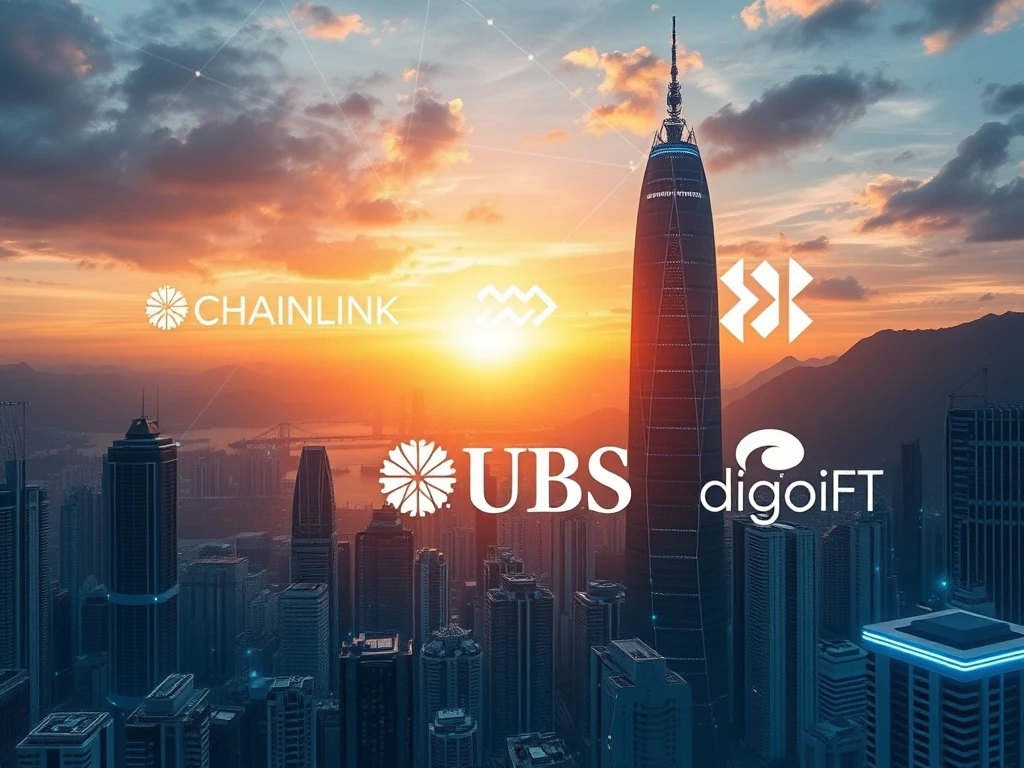RWA Tokenization: Revolutionizing Finance in Hong Kong with Chainlink, UBS, and DigiFT

The landscape of finance is rapidly evolving. Specifically, RWA tokenization is reshaping how assets are managed. A significant collaboration has emerged from Hong Kong. Chainlink, UBS, and DigiFT are now piloting an automated tokenization fund. This initiative promises to streamline digital asset management. It marks a crucial step for institutional crypto adoption in Hong Kong.
Unpacking the Groundbreaking Hong Kong Pilot for RWA Tokenization
This notable collaboration involves several key players. Chainlink, a leading blockchain oracle provider, is a central participant. UBS, a massive $5.9 trillion asset manager, also joins the effort. DigiFT, an exchange specializing in tokenized assets, completes this powerful trio. Their joint pilot aims to automate real-world asset (RWA) tokenization funds. This innovative feature could eliminate manual errors, according to the involved companies. Indeed, its success holds major implications for RWA tokenization across Hong Kong. This region operates as a special administrative region of China. The announcement details their shared goal: “developing a regulated blockchain-based infrastructure designed to automate and streamline the distribution, settlement, and lifecycle management of tokenized products.” This project forms part of Hong Kong’s Cyberport Blockchain & Digital Asset Pilot Subsidy Scheme. This sandbox environment tests novel crypto ideas for future implementation within Hong Kong’s financial ecosystem.
The Automated Workflow: Chainlink’s Pivotal Role in Digital Assets
The project’s workflow is meticulously designed for efficiency. First, investors submit subscription or redemption requests for UBS’s tokenized products. They do this directly through DigiFT’s smart contracts. Subsequently, Chainlink’s Digital Transfer Agent contracts process these instructions. These contracts function as the critical infrastructure layer. They verify orders and record them directly on-chain. Once processed, these orders automatically trigger corresponding issuance, redemption, and other lifecycle events. These events occur on UBS’s tokenized product contracts. Significantly, these contracts reportedly adhere to the Capital Markets Technology Association (CMTA) Token standards. This framework, developed in Switzerland, aims to harmonize digital securities issuance. This streamlined process underscores Chainlink‘s vital role. It ensures secure and automated operations for these digital assets.
Furthermore, DigiFT, an expert in tokenized assets, provides crucial feedback. They assess whether the technological implementation meets compliance. They also ensure interoperability requirements for the zone’s financial institutions. This ensures the system integrates seamlessly with existing financial frameworks. This rigorous approach builds trust and reliability.
Why Automation Matters for UBS and the Future of Finance
Manual reconciliation and fund adjustments often lead to significant problems. Tracking errors or discrepancies between a fund’s value and its underlying assets can frequently occur. Automation directly addresses these inherent inefficiencies. Trends in RWA tokenization funds increasingly involve decentralized finance (DeFi) integrations. Yield generation strategies are also becoming common. These advancements highlight the growing need for automated solutions. Automation significantly increases overall efficiency. Consequently, implementing it can lower operational costs substantially. This, in turn, boosts revenue for fund operators. Alternatively, these savings can be passed directly to investors. Such benefits make automation a compelling choice for financial institutions like UBS. It enhances both profitability and investor satisfaction. This pilot demonstrates a clear path towards more robust and reliable financial products for the future.
Hong Kong’s Progressive Stance on Crypto and DigiFT’s Contribution
Unlike mainland China, Hong Kong boasts a clear regulatory framework for digital assets. However, it remains subject to broader Chinese rules. Recent reports suggest forthcoming crypto restrictions on Chinese companies operating in the administrative zone. Despite this, Hong Kong actively explores various crypto ideas within Cyberport. These include decentralized identity solutions, advanced payment systems, and stablecoins. Blockchain for social innovation and digital experiences also feature in these explorations. This forward-thinking approach positions Hong Kong crypto as a potential global hub. The city aims to attract innovation while maintaining stringent regulatory oversight. The pilot with Chainlink, UBS, and DigiFT exemplifies this commitment. It showcases a strategic move towards integrating blockchain technology into mainstream finance. This balances innovation with necessary controls and compliance.
The Broader Landscape of RWA Tokenization and Institutional Adoption
RWA tokenization has seen significant momentum in recent years. Institutions have increasingly entered the crypto space. Concurrently, crypto exchanges have ventured into traditional finance areas. For instance, tokenized institutional alternative funds surged 47% to $1.74 billion over a 30-day period ending August 29. The overall RWA tokenization market cap has largely trended upward. According to CoinGecko, the market capitalization of all real-world asset coins, encompassing protocols and tokenized assets, has reached $66 billion. This figure shows a 1.8% increase in just 24 hours at the time of writing. Traditional finance institutions and crypto exchanges have cross-pollinated the world of real-world asset tokenization. BlackRock and Franklin Templeton, for example, now offer funds backed by US Treasurys. Kraken and Bybit have similarly explored tokenized stocks. The integration of DigiFT into this pilot further solidifies this growing trend. It highlights the mainstream adoption of these innovative financial tools.
Future Outlook and Challenges for Digital Assets with Chainlink and UBS
The path forward for digital assets and RWA tokenization holds immense promise. However, several challenges remain. These include achieving greater regulatory clarity across different global jurisdictions. Ensuring seamless interoperability between various blockchain networks is also crucial. Scalability solutions are continuously being developed to handle increasing transaction volumes. This pilot, featuring Chainlink and UBS, addresses several of these challenges directly. It establishes a regulated framework within Hong Kong. It also demonstrates practical interoperability through established standards like CMTA. As more traditional financial players embrace this technology, the market for tokenized RWAs will undoubtedly expand. The collaboration represents a blueprint for future integrations. It fosters a more efficient and accessible global financial system for everyone.





